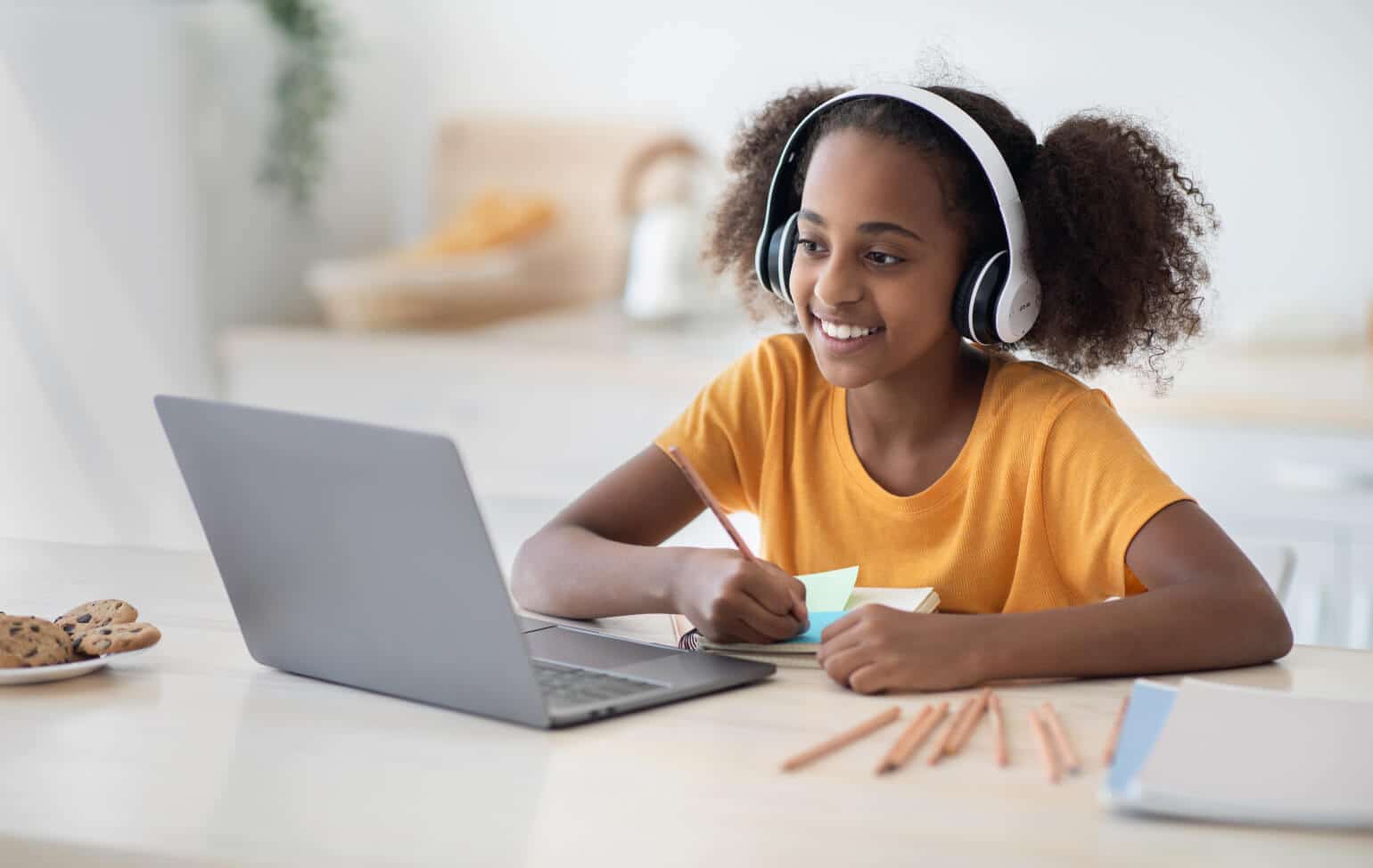Anxiety is common at every age and stage of life, but when it comes to K-12 students, social anxiety disorders can be a barrier to learning in an in-person school.
According to EdWeek.org, 50% of middle school students and 56% of high school students report feeling depressed, stressed or anxious as their biggest obstacle in the classroom.
It’s crucial to create a supportive school environment that promotes mindfulness, open communication and access to resources that help students manage their anxiety – and online courses offer many benefits that could set your student up for academic success.
Understanding student anxiety
Anxiety has a variety of symptoms. Academically, anxiety can appear as problems with concentration and function, struggling to make good grades and refusing to go to school. Socially, it can show up as avoidance of peer interactions, refusal to participate in group activities, social isolation and trouble making friends. This long-term anxiety can create an emotional burden that may eventually manifest as physical symptoms, such as headaches or stomach aches and potentially develop into depression.
According to the Department of Education, distance learning has provided new educational opportunities, with fully digital or hybrid formats becoming more widely available. This is specifically true in college prep charter schools and public charter schools, with many offering tuition-free options. They can help relieve some of the day-to-day anxiety in students by creating an environment that works to promote success based on their unique learning style and improves students’ mental health and quality of life.
Benefits of online schooling for students with anxiety
- Flexible learning environment
Online learners have the opportunity to learn in a comfortable and familiar setting, which can significantly alleviate anxiety. Flexible schedules allow students to manage their coursework effectively and offer more time to pursue activities that bring them happiness like visual arts and athletics, as well as other extracurricular activities that promote physical education and well being. - Minimized social pressure
Digital learning environments reduce exposure to in-person bullying or peer pressure, creating a safer space for students. They also provide opportunities for shy or introverted students to participate more freely in discussions and activities without the fear of judgment. - Personalized learning pace
Students can adjust their learning pace to meet individual needs, allowing them to absorb material without the pressure to keep up with classmates. This approach enables students to focus more on subjects they are interested in, reducing anxiety associated with less-enjoyable subjects. - Empowered social connections
Just because students aren’t face-to-face most of the time doesn’t mean that they aren’t social. According to the American Physical Society, students in hybrid settings were more connected and more likely to form more diverse, casual relationships outside their immediate friend groups. Online social activities like interactive lessons, school-supervised chat rooms and social media allow students to socialize at their own comfort level. - Improved support
Online schools offer additional support that might not be accessible in a traditional classroom. It can enhance family connections by allowing students to spend more time at home and give students access to counseling and mental health support, providing essential resources for managing anxiety.
Challenges of online schooling
- Lack of social interaction
As we saw during the COVID-19 pandemic, a lack of social situations can potentially lead to isolation and loneliness, with limited opportunities for developing social skills and friendships. However, online social activities are available whenever and wherever, and students have freedom to pursue interests outside of school as well. Many schools across the country also offer a local hybrid option, including ASU Prep Digital+ for Arizona students. - Need for self-discipline and motivation
Online schooling requires discipline, and students must be self-motivated to manage their time effectively. Learning at home can potentially cause distraction without structured supervision, but with practice, your student can develop valuable habits that will help them stay on track and get the most out of their education. - Technology barriers
Access to reliable internet and technology can be a hurdle for many families, as well as knowledge around the usage of digital tools and platforms. However, help is available through seminars, video tutorials, online blogs and more that walk you through preparing your student for online learning.
Tips for parents and educators
- Create a supportive home environment
Establish a dedicated, distraction-free study area and encourage regular breaks and physical activity. - Facilitate social opportunities
Encourage participation in virtual clubs or group projects and organize regular meet-ups with peers in a safe environment. - Monitor and support mental health
Take action once you recognize signs of anxiety or distress and stay educated through online resources and support groups tailored to student needs.
As educators, parents and guardians, it’s important to create a safe, supportive learning environment that ensures students can thrive academically and socially. This may look like a traditional school program, a hybrid offering with more face-to-face interactions or a fully digital environment that gives your students more freedom to learn at their own pace. This decision should be made based on the individual challenges of your student, but it can always be reassessed and adjusted based on your student’s needs as they advance grade levels. Explore your online schooling options and support networks today and find a setup that not only supports your student, but your family’s lifestyle as well.
Explore a more flexible and personalized educational path with ASU Prep Digital
Making the switch to online schooling is simpler than many parents realize, whether you’re starting at the beginning or midway through the school year. ASU Prep Digital offers an exciting opportunity for families looking to move beyond traditional homeschooling or public/private schooling, providing the flexibility and personalization where online education excels.
Our dedicated team at ASU Prep Digital is here to guide you through every step of the enrollment process, ensuring a seamless transition. We understand that each child deserves a tailored educational experience that is both unique and easily accessible.
As an accredited online school serving grades K–12, ASU Prep Digital proudly stands as Arizona’s #1 Online School, as recognized by Niche.com. Our innovative teaching model empowers students to learn comfortably from home, utilizing cutting-edge technologies and offering multiple layers of personalized instruction and support.
Moreover, our program serves as a comprehensive college prep pathway where high school and college courses intersect. This prepares students for college admissions and encourages them to begin earning credits toward their future college majors and careers.
We support districts in Arizona, while serving students and schools around the world. To learn more about ASU Prep Digital, please visit our website.
Is online school a good solution for student anxiety? FAQs
How does online schooling help reduce student anxiety?
Online schooling offers a flexible learning environment that can reduce anxiety by allowing students to learn at their own pace and minimize stress from in-person classrooms. In the comfort of their own home, students can develop an enhanced focus on academics in a supportive and nurturing way.
Can online school provide adequate social interaction for students with anxiety?
Yes! Online schools offer discussion boards, interactive lessons and games and group projects. It encourages collaboration and fosters community without forcing face-to-face interactions that may cause anxiety in some students.
How do online schools accommodate students with anxiety-related learning challenges?
Online schools offer a flexible learning environment with minimized social pressure, a personalized learning pace for individual student needs, social connections for community and improved educational and emotional support when needed.




